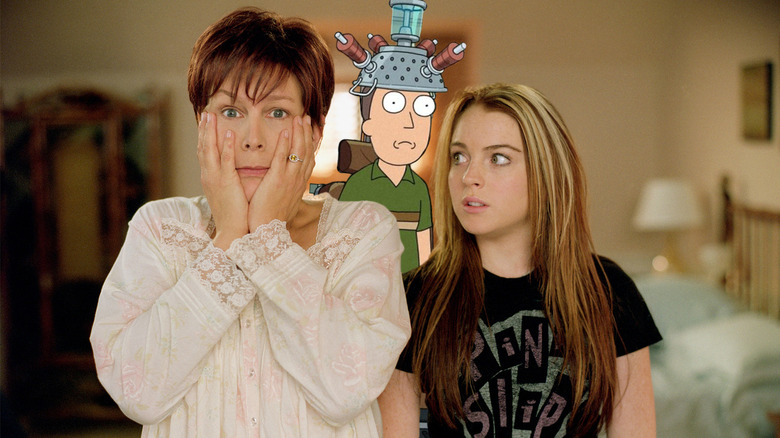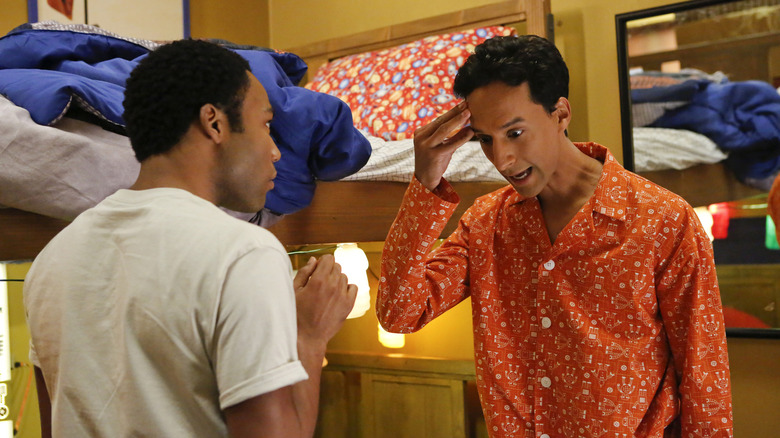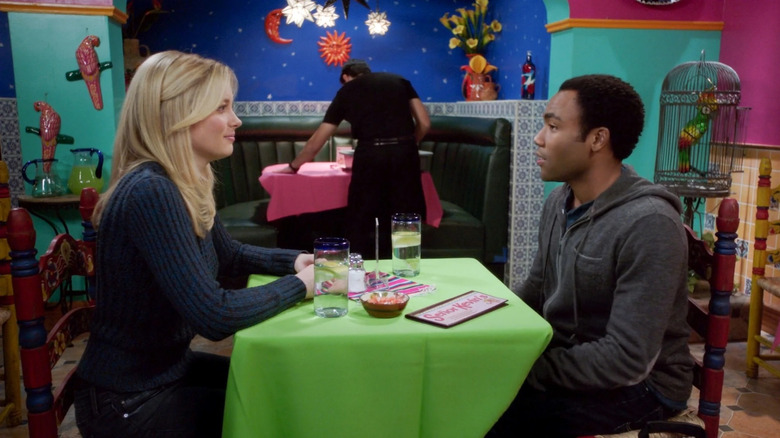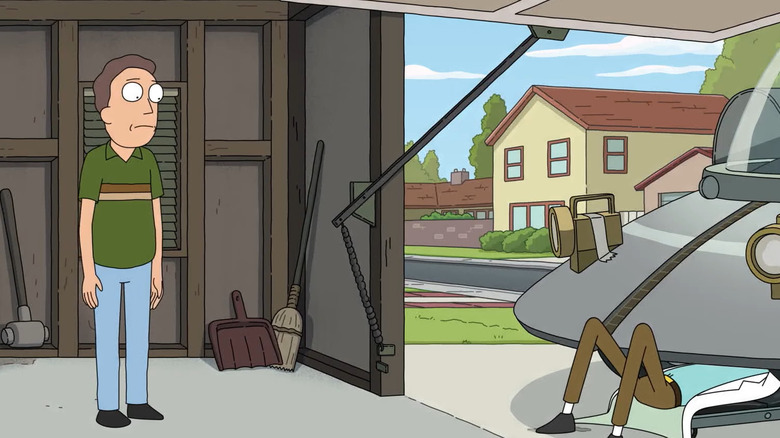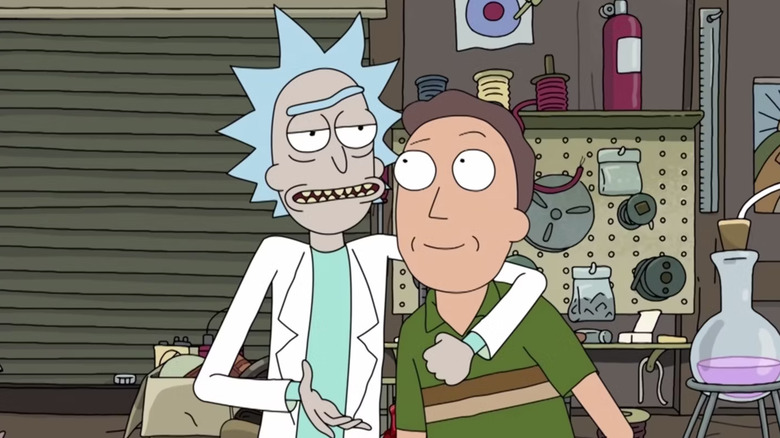Rick And Morty Season 7 And Community Both Took Inspiration From A Beloved Disney Movie
Ah, "Freaky Friday" — what a concept. Since the original book was published in 1972, it's since been adapted into two theatrical films, two made-for-TV films, and a musical. The appeal of the premise is obvious: It's good to teach kids about the importance of putting yourself in another person's shoes (or skin) and really thinking about what their life is like. It's also just a funny concept in general, leading to all sorts of weird and uncomfortable hijinks. The Disney films didn't go too crazy with the idea of course, but John Mulaney crossed a few lines with his "Saturday Night Live" sketch based on the premise. He played the showrunner of an old sitcom where the son and dad switch bodies, except he decided to focus the show "exclusively on the sexual ramifications" of this idea, with horrifying results.
When "Community" did its own "Freaky Friday"-themed episode, it also didn't shy away from any such details. One of the first things the body-swapped Troy and Abed do is check out each other's genitals, and when The Dean "switches" bodies with Jeff, he immediately turns it into a role-playing exercise he's clearly getting a sexual thrill out of. (Jeff isn't into this at all, but at least Annie appreciates the performance.) The latest "Rick and Morty" episode also takes an unfiltered approach to its "Freaky Friday" inspired plot, with Beth pointing out how uncomfortable it is to have her father and husband mixed into the same body.
But the differences go much deeper than that, of course. Both shows start with the goofy, familiar premise, but then take it in an unexpected direction and deliver one of best episodes of their respective seasons. Which show did it better? Well, it's hard to say...
Community's approach
At first glance, season 4's "Basic Human Anatomy" feels like a straightforward homage, with Abed (Danny Pudi) and Troy (Donald Glover) trying to switch bodies by holding the "Freaky Friday" DVD case and saying in unison, "I wish I could switch places with you for just one day." At first it doesn't work, but when they wake up the next morning they discover it has. Cue some awkward hijinks where Troy takes Britta on a date in Abed's body, and Abed has to help Jeff find the original "Freaky Friday" DVD in Troy's body.
The big twist is that Abed and Troy didn't actually switch bodies; this was all part of Troy's questionable method of breaking up with Britta. He doesn't know how to do it straightforwardly, so he has Abed deliver the message to Britta under the guise of being himself, while he confesses his feelings about the break-up privately to Jeff in the guise of Abed. It's only here that Jeff lets go of his episode-long frustration against the two of them, and starts being nice again.
It's a messy storyline, especially if you're looking at it just from Britta's perspective. Realistically, this has got to be the most cowardly and insulting way for someone to break up with their girlfriend, but the show has Britta handle it all with perfect grace. It makes sense for Britta, as she's the wannabe-therapist in the group who constantly prioritizes everyone's feelings over her own, but the show itself doesn't seem to fully recognize how obnoxious this stunt is. For those of us who wish the show could treat Britta better, it's still hard to swallow.
Why it still works
Still, "Basic Human Anatomy" is one of the strongest episodes in an admittedly weak season of "Community," in part because of how it plays around with the series' conventions. Given what had happened up to this point, a "Freaky Friday" parody wouldn't actually have been that out of line. "Community" is the same show that had a school-wide pillow fight and an actual (non-hallucinatory) zombie apocalypse, and that's not even counting the time where the school was taken over for weeks by an evil dictator who had secretly replaced The Dean with a doppelganger. (Sorry, I mean a doppeldeaner.) A genuinely supernatural body-switching plot point would still be somewhat out of place for this show, but only by a little bit, and the episode mines a lot of comedy over the initial ambiguity over whether or not this is real.
The episode also continues along the show's time-honored tradition of mixing its high-concept storylines with realistic character beats that genuinely matter. Once it's clear Troy and Abed haven't actually switched bodies, what we get instead is a thoughtful exploration of how Troy's relationship with both Jeff and Britta have developed over the years. Troy's childishness might get on Jeff's nerves sometimes, but Jeff will always be there for encouragement when Troy needs it; Britta might not have turned out to be a good romantic fit for Troy, but she's still grown to be his good friend and confidant. The times where Troy would casually call Britta "the AT&T of people" and "a pizza burn on the roof of the world's mouth" have long ended by this point, and "Basic Human Anatomy" celebrates this growth even as it mourns the demise of their official relationship.
How Rick and Morty handled it
Dan Harmon's animated sitcom, meanwhile, explored the concept with a bit more bluntness. Unlike "Community," this is a show that's fully allowed to embrace science fiction and fantasy concepts, which means they can do a straightforward "Freaky Friday" episode with no damage to the overall series. The problem is that "Rick and Morty" isn't interested in doing that, especially not for Rick and Jerry. The two are so utterly unalike that spending a day in each other's shoes would not teach either of them anything. The show embraces this by having the concept result in their brutal, immediate deaths. Even by this show's standards, the sight of their brains splattered all over the garage is still gruesome.
"The Jerrick Trap" revolves instead around roughly half of Jerry and Rick's (revived) brains being switched between the two bodies. What's the exact percentage of each? It's not clear, but it quickly turns out that mixing Rick's intelligence with Jerry's decency is the best thing that's ever happened to them. After some initial arguing, the two make a great team — so great, in fact, that they don't want to go back. They like this wonderful new balance the two of them have found, and they appreciate the value in finding a friend that's actually on their level. Usually Rick is so far above the rest of the family that he's basically a god, and usually Jerry is so far below that he feels like no one respects him. By trapping both halves of them in the same two bodies (in what turns out to be a gross homage to "The Parent Trap"), the two characters are finally forced to not just see each other's perspective, but to appreciate the other's contrasting traits.
Shining some light on the show's best pairing
This is hardly the first time that "Rick and Morty" has done a Rick and Jerry episode. Since season 3's "The Whirly Dirly Conspiracy," the show has clearly realized that these two make for the show's most thematically riveting dynamic. When Rick and Jerry collide, the show's implicitly asking which is better: intelligence or decency? With Rick's brilliance comes inherent loneliness, and with Jerry's stupidity comes a wonderful ability to find joy and meaning in the mundanities of real life. Considering how high Rick reigns above the rest of the family, the show is always ruminating on this question to some extent, but it's with Jerry that it does so in its purest form.
"The Jerrick Trap" also continues the trend of making Jerry and Rick grow closer as the show goes on. They've gone from mutual enemies to begrudging allies over the years, but this might be the first time they've reached the level of genuine friendship. Okay sure, they end the episode yelling at each other again, but the fleeting bond was nice while it lasted. We've learned, as Morty put it, that Jerry and Rick "both love each other more than [they're] willing to admit." It's a heartwarming observation, and one that required a messed-up spin on a family-friendly Disney film to truly pull off.
So, which show pulled off the "Freaky Friday" concept better? It remains a tough question, as neither of them actually played the idea straight. Still, both episodes play to their show's strengths, successfully taking a whacky concept and using it to meaningfully comment on its main characters. All we've got to do now is wait until Dan Harmon's new show "Krapopolis" does its own "Freaky Friday" episode, and we'll have ourselves an unofficial trilogy.
